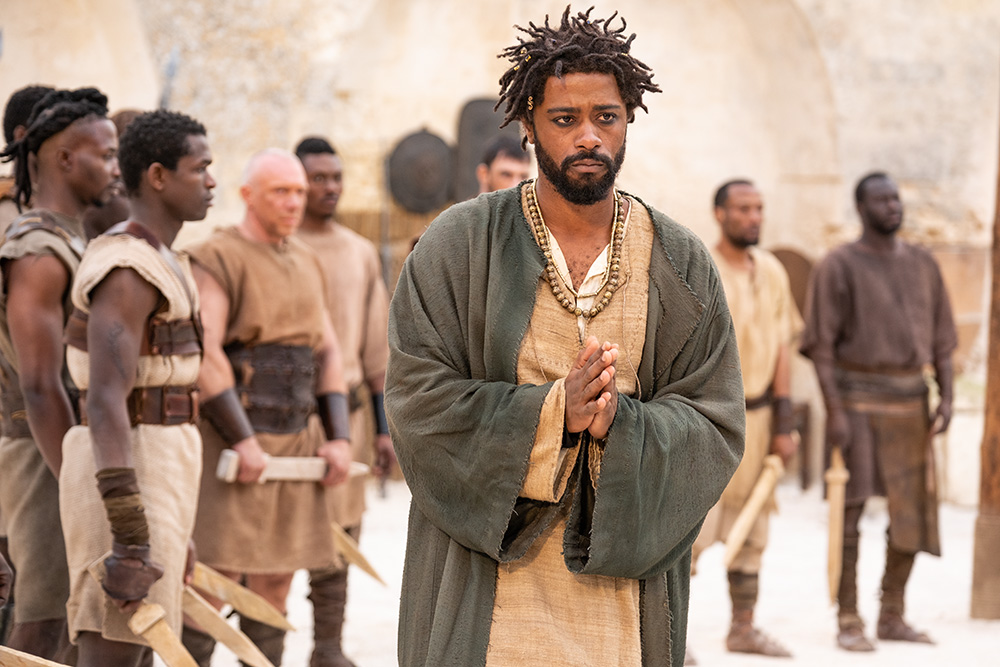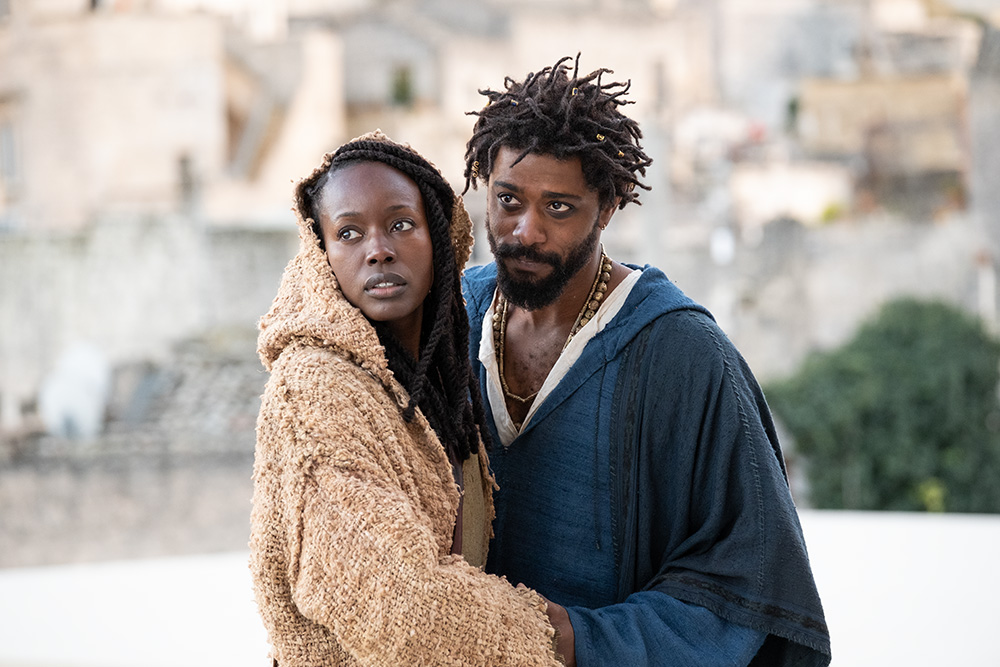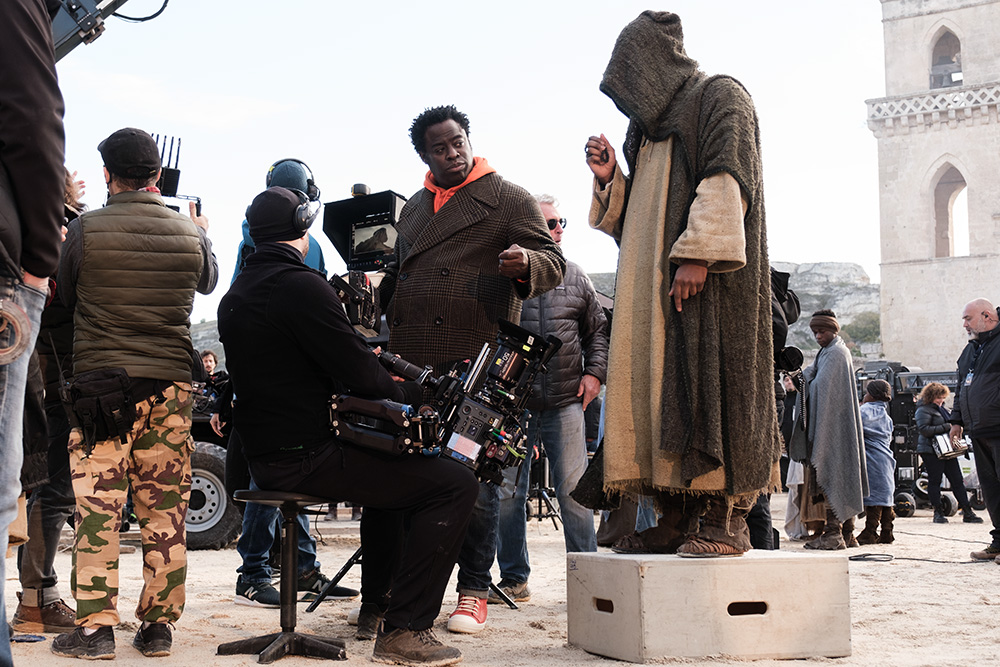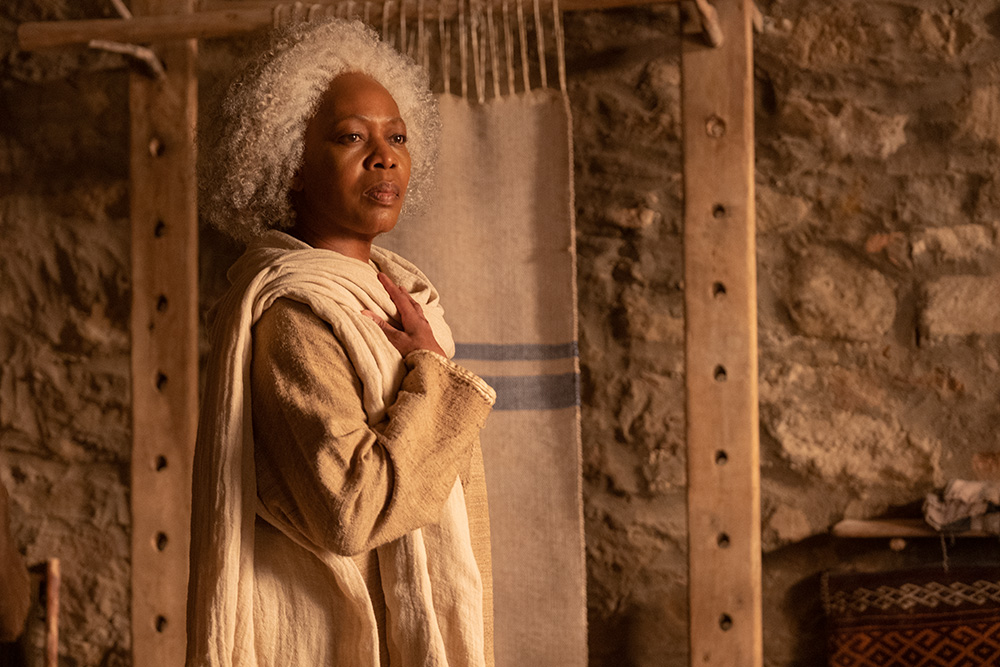
LaKeith Stanfield as Clarence in "The Book of Clarence" (Moris Puccio)
The late Rev. James Cone, known as the father of Black liberation theology, stated in his book God of the Oppressed that God is Black. "Christ is black, therefore, not because of some cultural or psychological need of black people, but because and only because Christ really enters into our world where the poor, the despised, and the black are, disclosing that he is with them, enduring their humiliation and pain and transforming oppressed slaves into liberated servants."
In the biblical comedy "The Book of Clarence," British writer and director Jeymes Samuel brings to life East Jerusalem A.D. 33 inhabited by Black people and a colonizing white force of Romans.
The story follows Clarence (LaKeith Stanfield), the village mischief maker who is trying to save his life after he lost a bet. He also is motivated to prove to his family and the woman he loves, Varinia (Anna Diop), that he isn't a nobody.

Anna Diop as Varinia and LaKeith Stanfield as Clarence in "The Book of Clarence" (Moris Puccio)
Initially, Clarence concocts a plan to join his twin brother Thomas (also played by Stanfield) and become the 13th apostle of Jesus (Nicholas Pinnock). When that plan fails, Clarence, a self-professed unbeliever, decides to become a fake messiah in order to obtain money, power, influence and a way to pay back his debt and have his life spared.
While "The Book of Clarence" is set during the time of Jesus, the story is told through a Black cultural lens and employs magical realism. The cast, made up of African Americans and actors from the diaspora, is excellent. And while there are many laughs and entertainment like levitation and a dance scene, the movie also explores contemporary issues facing Black Americans including racial profiling and police brutality.
Though the movie is rated PG-13, there are graphic depictions of carrying the cross and crucifixion that may be difficult to watch for younger teens or sensitive viewers, and widespread smoking and recreational drug use.
Advertisement
In addition to the religious story, Clarence's journey is also one that many people today face. He has pressure to take care of his mother (Marianne Jean-Baptiste) after his brother leaves to follow Jesus. He struggles to make ends meet without an honorable trade to provide a living. And he wants to prove his self-worth to those who believe he is a wayward soul that will amount to nothing.
There is also a budding love story with Clarence's object of affection, Varinia, who wants Clarence to change his ways and become honorable and authentic.
For Clarence and his good friend and sidekick, Elijah (RJ Cyler), disbelief in God and Jesus as Messiah are only remedied by personal experiences with the Divine. For centuries, African Americans have relied on their personal faith and encounters with God to help them overcome hardships and have hope for a better future. During a time of increased societal secularization, the movie's message about faith and belief will resonate with many people who struggle with personal doubt or have family and friends who have strayed from the Christian faith.

Director Jeymes Samuel on the set of "The Book of Clarence" (Moris Puccio)
Though "The Book of Clarence" is not considered a "faith-based" film, and Samuel wants all people regardless of religious background to feel comfortable watching the movie, it still offers much for Catholics to ponder and reflect on their own faith.
One such source of reflection that the movie playfully depicts is the centurieslong inaccurate portrayal of Jesus as a white, European-looking man. The popular series "The Chosen" stands out as one of the most successful media portrayals with Jesus as a Middle-Eastern-looking man to date, which is more authentic. So, while it is historically inaccurate to portray Jesus as African American, so too have the countless portrayals of Jesus as white been historically inaccurate yet largely unquestioned and accepted.
It is a bold and necessary move to depict the holiest man, Jesus, the Virgin Mary, disciples and followers as Black in a world that constantly seeks to criminalize, dehumanize and subjugate people with Black skin.

Alfre Woodard as the Virgin Mary in "The Book of Clarence" (Moris Puccio)
When reflecting on Cone's seminal work The Cross and the Lynching Tree, Nikia Smith Robert wrote, "To understand the cross and the lynching tree is to recognize the tragedy of crucifixion but also to appreciate the beauty of resurrection. This is to say, the defeat of death does not have the last word. Jesus snatches victory from defeat."
"The Book of Clarence" has an excellent twist at the ending that beautifully illustrates Jesus's victory over death. Overall, the movie was a breath of fresh air and needed departure from so many African American movies that depict Black trauma, oppression and other negative experiences. Though the African American experience has indeed been filled with much pain, sorrow and anguish, it's also important for filmmakers and artists to imagine and depict a world with Black joy, triumph and inspiration.
Like the Gospel message, the movie leaves the audience hopeful and filled with awe for the miracle-working Jesus, who has always been and continues to side with the oppressed, marginalized and outcast in society.







